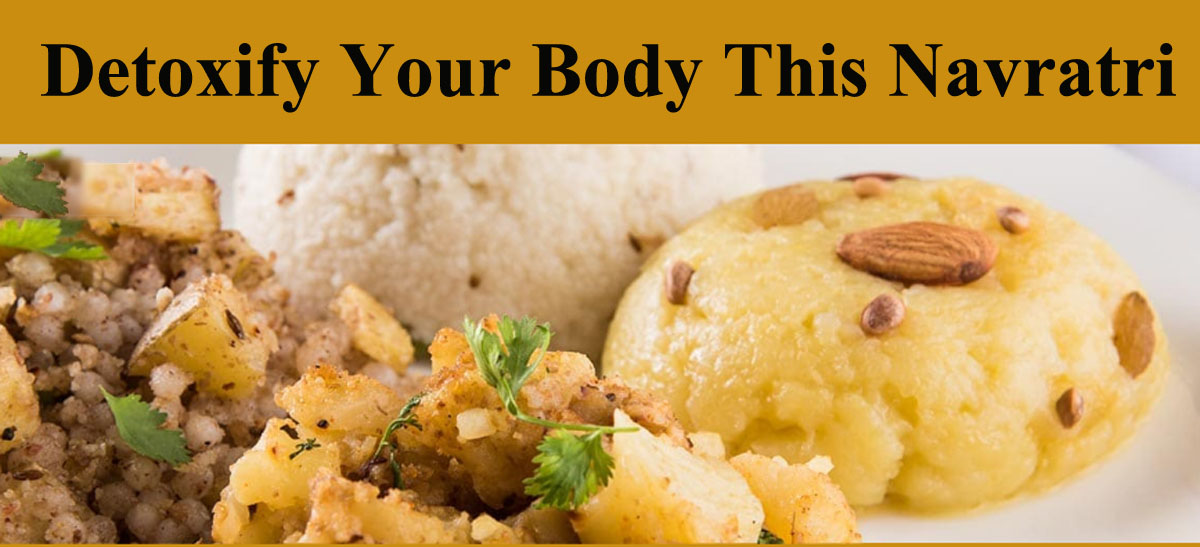How Navratri Fast Helps You To Detoxify The Body

Detoxification means removing toxins from the body. Like in Spring when the season changes we have a feeling of cleaning our house and readying our gardens to welcome the new season. The same goes for our body too we also need internal cleansing from the toxins and change gear and get ready for the next seasonal cycle. Detoxing is like cleaning the body from inside at a cellular level.
We celebrate the Navratri festival in India during the spring and Autumn season when people observe fast and pray to Goddess for prosperity and health for the nine auspicious days of Navratri. It is the best time to indulge in spiritual activity and give your body a break from regular activity. Traditionally ingredients used during Navratri fast are very healthy and wholesome, they have all the essential nutrients needed by our body to protect us from the effect of changing the weather, as we have a habit of eating high fat and sugary and calorie-rich food.
By observing Navratri fast you are serving a dual purpose one is worshiping Goddess Durga and on the other, you are detoxifying your body. In the Navratri, the detox diet makes sure your food has goodness from all the Sattvik ingredients with lots of water, without which your detox will be incomplete. Avoid fried food and opt for a steamed version instead, include yogurt and lassi in your diet to keep you full and optimum fluids in your body. Here is the list of fasting food and beverages you can have in Navratri to detox your body, enhance digestion, and increase positivity.
Water
The best way to detoxify your body is to drink a lot of water, which will help you in eliminating waste from the body and give energy to the body to cleanse itself of toxins. Adding fresh lemon juice to water is a good way to enhance its taste, you can sip lemon water throughout the day during Navratri fast.
Traditional Flours
Buckwheat (kuttu) flour, water chestnut (singhara) flour, amaranth (rajgira) flour, and millet (saame) flour are the flours that you can eat during Navratri fast. These are gluten-free flours and are considered a healthy alternative to wheat flour. Sabudana is also one of the rich sources of protein in the body which you can eat during fast.
Jaggery instead of regular sugar
During fasting instead of consuming regular sugar try jaggery which is an unrefined sugar product. Jaggery is definitely a healthier option for sugar which will improve your digestion and give you energy for day-to-day work.
Rock Salt
Rock salt or sendha namak is the purest form of salt owing to its unprocessed form, is used during fasting which has cooling properties as compared to other salts. It is low in sodium and high in potassium hence helps to keep a balance of electrolytes in the body without affecting the blood pressure levels.
Suggested Read: Navratri Festival Recipes
Always eat a handful of dry fruits
Seeds and nuts are a good addition to your meal when you starve of hunger prangs to load your body with useful fiber and polyphenols. Dry fruits give you the much-needed energy and nutrients you need during fasting.
Fresh Fruits
Eat a lot of fresh fruits, especially seasonal varieties. Apples, Banana, papaya, grapes, and watermelons are always loved during fasting.
Eat at regular intervals
Fasting doesn’t mean you have to starve your body, it means giving up certain types of food and eating other healthy versions. Always eat light and healthy snacks whenever you are feeling hungry, you can munch fruits, salads in between meals.
Suggested Read: Asthami or Navami Prasad recipe
